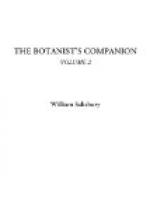237. MENYANTHES trifoliata. Buck-bean. Leaves. L. E. D.—This is an efficacious aperient and deobstruent; it promotes the fluid secretions, and, if liberally taken, gently loosens the belly. It has of late gained great reputation in scorbutic and scrophulous disorders; and its good effects in these cases have been warranted by experience: inveterate cutaneous diseases have been removed by an infusion of the leaves, drunk to the quantity of a pint a-day, at proper intervals, and continued some weeks. Boerhaave relates, that he was relieved of the gout by drinking the juice mixed with whey.
238. MOMORDICA Elaterium. SPIRTING cucumber. Fruit L. E. D.—Elaterium is a strong cathartic, and very often operates also upwards. Two or three grains are accounted in most cases a sufficient dose. Simon Paulli relates some instances of the good effects of this purgative in dropsies: but cautions practitioners not to have recourse to it till after milder medicines have proved ineffectual; to which caution we heartily subscribe. Medicines indeed in general, which act with violence in a small dose, require the utmost skill to manage them with any tolerable degree of safety: to which may be added, that the various manners of making these kinds of preparations, as practised by different hands, must needs vary their power.
239. Morus nigra. Mulberry. Fruit. L.—It has the common qualities of the other sweet fruits, abating heat, quenching thirst, and promoting the grosser secretions; an agreeable syrup made from the juice is kept in the shops. The bark of the roots has been in considerable esteem as a vermifuge; its taste is bitter, and somewhat astringent.—Lewis’s Mat. Med.
240. Nicotiana Tabacum. Tobacco. Leaves. L. E. D.—Tobacco is sometimes used externally in unguents for destroying cutaneous insects, cleansing old ulcers, &c. Beaten into a mash with vinegar or brandy, it has sometimes proved serviceable for removing hard tumours of the hypochondres.
241. Origanum Majorana. Sweet marjoram. Herb. L. E.-It is a moderately warm aromatic, yielding its virtues both to aqueous and spirituous liquors by infusion, and to water in distillation. It is principally celebrated in disorders of old people. An essential oil of the herb is kept in the shops. The powder of the leaves proves an agreeable errhine.
242. Origanum vulgare. Pot marjoram. Herb. L. D.—It has an agreeable aromatic smell approaching to that of marjoram, and a pungent taste much resembling thyme, to which it is likewise thought to be more nearly allied in its medicinal qualities than to any of the other verticillatae, and therefore deemed to be emmenagogue, tonic, stomachic, &c.
The dried leaves used instead of tea are said to be extremely grateful. They are also employed in medicated baths and fomentations.—Woodville’s Med. Bot. p. 345.




